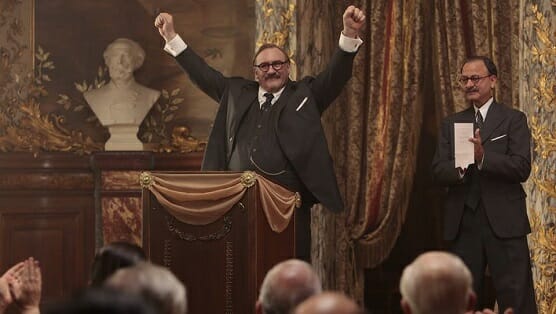United Passions

A world premiere at the 2014 Cannes Film Festival, United Passions is a seemingly very sincere and yet altogether odd corporate hagiography that affirmatively celebrates the gloriousness of FIFA, the governing body of football… errr, soccer. Touching on allegations of payola or other impropriety that have dogged the organization for apparently decades, but without saying anything of substance, director Frédéric Auburtin’s movie is a mushy, stakes-free drama that attempts to impress all the conventions of biographical cinema upon a self-impressed overview of business world maneuvering and horse-trading.
United Passions is structured in triptych fashion, detailing FIFA’s wrought founding and the subsequent passing down of its presidency between three men. First is Frenchman Jules Rimet (Gerard Depardieu), the group’s third chief executive and its longest-serving at 33 years. The next substantive segment focuses on Brazilian Joao Havelange (Sam Neill), a lawyer and International Olympic Committee member who as FIFA’s seventh president sets about refilling the group’s coffers and expanding its reach into Africa, while the last third of the movie focuses on his Swiss consigliere, Sepp Blatter (Tim Roth), who is described as “good at finding money.”
From one of its first brief scenes, an impassioned letter-writing sequence with sunlight streaming in through a window, it’s clear that United Passions will be trading in clichés and two-dimensional characterizations. Fitfully, the film tries to pivot out of a straight checklist-chronicling of organizational highs and lows, and connect to issues like racial and gender equality—most notably in a finale of dubious uplight.
These efforts might ring a bit truer if the film’s use of female characters weren’t entirely representational. The one of note, Annette Rimet (Jemima West), exists solely to reflect and flatter and her father Jules’s efforts, and remind him what a great man he is. Likewise, the movie’s sermonizing as soccer being a great social equalizer and force for moral justice—Rimet dismissively dealing with some cartoonishly snooty and racist Brits, or Havelange on the phone lecturing an unseen South African official about the evils of apartheid—comes across as ham-fisted.
-

-

-

-

-

-

-

-

-

-

-

-

-

-

-

-

-

-

-

-

-

-

-

-

-

-

-

-

-

-

-

-

-

-

-

-

-

-

-

-








































